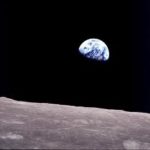The New Neighbors
Day begins in a little house at the edge of a quiet town.
“Good morning, darling. Ready for breakfast?”
“Yes, thanks. It smells wonderful. I may want a second helping.”
“There’s plenty. Something interesting on the news? You’ve been glued to that computer screen for over an hour. You didn’t even notice me walk by. Here’s your tea–careful, it’s hot.”
“Mmm. Delicious. Come look at this. You’re aware of the planetary survey that’s been going on the past several years, looking for worlds similar to ours in deep space?”
“Of course, though I haven’t paid much attention. All they ever find are gas giants, or planets too far or too near their star to be inhabitable.”
 “Well, yesterday they found one almost identical to ours.”
“Well, yesterday they found one almost identical to ours.”
“It took long enough. Are they certain?”
“As certain as they can be. See the chart there? The orbit’s squarely in the temperate zone, and the spectroscopic analysis seems definitive. Oxygen-nitrogen atmosphere and enough water vapor to confirm the presence of large oceans.”
“Amazing. I wonder if there’s anything living there.”
“There is. That’s the finding that’s really burning up the networks. There’s undeniable evidence of intelligent life, and its technology is fairly advanced.”
“How can the scientists be sure?”
“First, they noticed an abundance of hydrocarbons in the atmosphere, the sort that accompany industrial development. Then, somebody pointed a radio telescope at it and detected non-random emissions—information, not noise. They’re still trying to decode the entire language, but what’s been deciphered so far is intriguing. Unfortunately, the discovery is already causing a lot of unrest.”
“I don’t understand. I’d expect everyone to be excited that we’ve finally found evidence of life on other worlds.”
“The scientists are elated, but some people are afraid our culture will be disrupted by strange, alien ideas if we continue monitoring these signals. There’s also a faction that believes we should keep our presence hidden so we don’t disrupt the natural social development of the beings on the other planet, or possibly make ourselves a target for invasion. Even religious communities are rioting.”
“Why?”
“Many think it’s a hoax, a government ploy to convince people to abandon their faith. Others say the idea that our planet isn’t the center of creation is blasphemous, or they believe it’s impossible for more than one sort of being to be made in God’s image, so whatever is there must be soulless and evil.”
“Hmm. Why couldn’t God have made people like us on more than one world? I’ve always thought it’s a very large universe for there to be intelligent life only on our tiny planet. And if He made them, surely He’d reveal Himself to them, don’t you think? It’s sad…it’s like having new neighbors, and all we can do is assume the worst of them.”
 “I suppose it’s all moot. This new world is so far away we won’t reach it in our lifetime, even with our most advanced spaceships, and the evidence from the translations so far indicates the inhabitants are only beginning to think about exploring the space near their planet.”
“I suppose it’s all moot. This new world is so far away we won’t reach it in our lifetime, even with our most advanced spaceships, and the evidence from the translations so far indicates the inhabitants are only beginning to think about exploring the space near their planet.”
“What do they say?”
“It’s fragmentary, but a political leader called ‘Ralphkramden’ seems to be advocating a project to launch a lunar probe. The message is repeated over and over again: “To the moon, Alice! One of these days…Pow! Straight to the moon!”






























BWAHAHAHAHAHA!
Thanks for the laugh this morning, Fred.
Fred, way to give this scenario a twist. I didn’t know where you were headed until I got to the picture of earth. You embedded some thought-provoking ideas in with an enjoyable story.
BTW, I just finished re-reading Out of the Silent Planet. It’s been … decades. But the point is, certainly Lewis would have enjoyed your post. 😉
Becky
Cute! I like twists like this. I wonder how many post-Baby Boomers are going to get it though.
More seriously, I believe that God could quite definitely have created intelligent life on other planets and I have no doubt that His son would have visited them as well-perhaps at the very instant He came here.
Under the Mercy,
SherryT
Great stuff yet again, Fred. Your posts are quite the discussion starters, as well as imagination-inspiring.
About whether Christ has died for extraterrestrial life in similar ways to His known sacrifice for humans — I do think this can be shown from Scripture to be one of the few theological limits to our speculation. Most of this next is from my column on the older site, copied to here: Are extraterrestrials and extra-fast travels alien to Christianity?. However, any discussion on this (related) issue could take place there and not here, so as not to sideline the topic!
An excerpt from Bates’ book — and readers can be reassured that he’s not another reflexive “any imagining aliens is bad!” type guy, but instead loves Biblical truth and science fiction:
Sherry also said:
So on a much more substantive note, I must admit I had to web-search the phrase “To the moon, Alice!” to pinpoint its origin. (Embarrassed grin) It did sound slightly familiar, though. … By the way, (sing-songing) that guy (Jackie Gleason) looks a lot like Fred Flintstone! I wonder why?
For the record, I only know “To the Moon, Alice” as the name of a lovely whooshy sound effect in my music making software, but the pop-culture connection still works!
I apologize for the obscure pop culture reference, but I figured people would google it if they didn’t understand it, and so they did. I thought about posting a link to a Family Guy scene where Ralph actually does give Alice one “right in the kisser,” but domestic violence just isn’t funny, even in cartoon form. One of the charms of The Honeymooners was that you knew Ralph and Alice loved each other fiercely. Ralph would never, ever, lay a hand on his wife in anger, and they were sure to kiss and make up in the end.
Though I don’t take a position either way on the alien life issue, I don’t find Mr. Bates’ argument compelling, because it’s an argument from silence. The Bible doesn’t talk about alien life, and I wouldn’t expect it to because its focus is God’s dealings with mankind. Anything beyond that simply isn’t our story. It would be somebody else’s story. I certainly don’t think that it would be in God’s character to abandon anyone to Hell without providing revelation of His existence and an opportunity for redemption. Even in places the Gospel has not reached, the Bible tells us God has not left Himself without a witness (Acts 14:17).
Anyhow, I don’t see this as a question that’s likely to get a definitive answer before our Lord’s return. Makes for a fun conversation, though.
Loved the story.
I didn’t find Mr. Bate’s argument compelling either. Why would people or creatures not descended from Adam be affected by Adam’s fall? Why would Christ have to die for them? What if they did fall? What would stop Christ from going as a vulcan (or whatever) and dying for them as the Son of Vulcan?
I don’t think we will find other life here and now. But I certainly believe it’s possible that God has created life in other places. He’s so big. Why does he create neon colored fish to swim far under the waves where for centuries upon centuries no eye could see them but His? I don’t know why we would think he hasn’t created other pockets of life, purely for his own enjoyment.
My apologies to Mr. Bates for calling him Mr. Bate. 🙂
But did he bait?